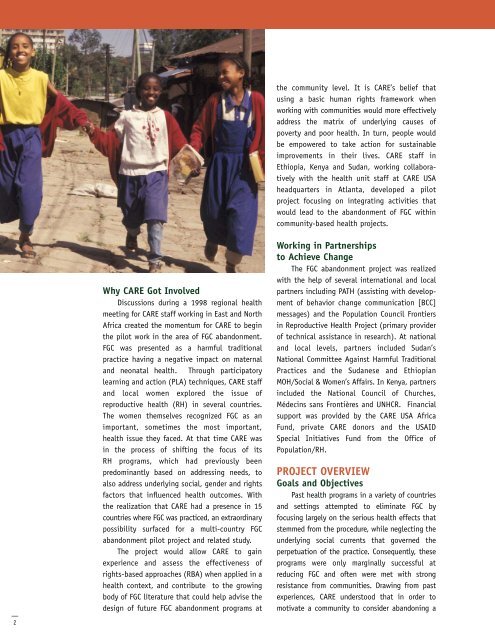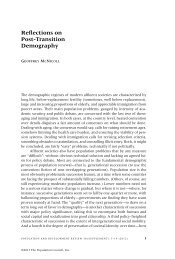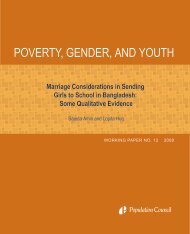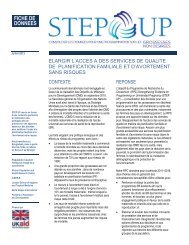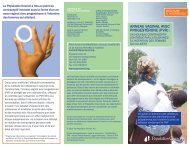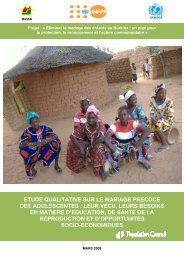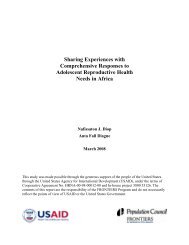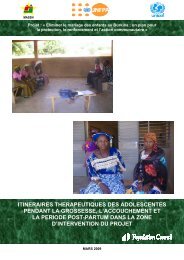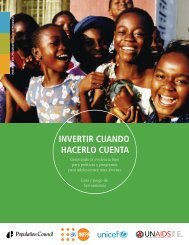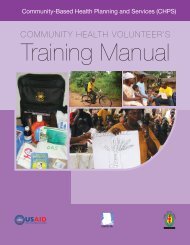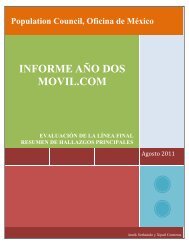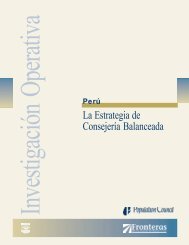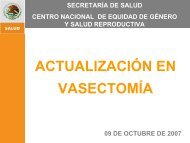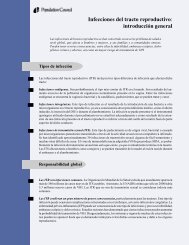CARE's Experiences Working with Communities toward ...
CARE's Experiences Working with Communities toward ...
CARE's Experiences Working with Communities toward ...
You also want an ePaper? Increase the reach of your titles
YUMPU automatically turns print PDFs into web optimized ePapers that Google loves.
|<br />
2<br />
Why CARE Got Involved<br />
Discussions during a 1998 regional health<br />
meeting for CARE staff working in East and North<br />
Africa created the momentum for CARE to begin<br />
the pilot work in the area of FGC abandonment.<br />
FGC was presented as a harmful traditional<br />
practice having a negative impact on maternal<br />
and neonatal health. Through participatory<br />
learning and action (PLA) techniques, CARE staff<br />
and local women explored the issue of<br />
reproductive health (RH) in several countries.<br />
The women themselves recognized FGC as an<br />
important, sometimes the most important,<br />
health issue they faced. At that time CARE was<br />
in the process of shifting the focus of its<br />
RH programs, which had previously been<br />
predominantly based on addressing needs, to<br />
also address underlying social, gender and rights<br />
factors that influenced health outcomes. With<br />
the realization that CARE had a presence in 15<br />
countries where FGC was practiced, an extraordinary<br />
possibility surfaced for a multi-country FGC<br />
abandonment pilot project and related study.<br />
The project would allow CARE to gain<br />
experience and assess the effectiveness of<br />
rights-based approaches (RBA) when applied in a<br />
health context, and contribute to the growing<br />
body of FGC literature that could help advise the<br />
design of future FGC abandonment programs at<br />
the community level. It is CARE’s belief that<br />
using a basic human rights framework when<br />
working <strong>with</strong> communities would more effectively<br />
address the matrix of underlying causes of<br />
poverty and poor health. In turn, people would<br />
be empowered to take action for sustainable<br />
improvements in their lives. CARE staff in<br />
Ethiopia, Kenya and Sudan, working collaboratively<br />
<strong>with</strong> the health unit staff at CARE USA<br />
headquarters in Atlanta, developed a pilot<br />
project focusing on integrating activities that<br />
would lead to the abandonment of FGC <strong>with</strong>in<br />
community-based health projects.<br />
<strong>Working</strong> in Partnerships<br />
to Achieve Change<br />
The FGC abandonment project was realized<br />
<strong>with</strong> the help of several international and local<br />
partners including PATH (assisting <strong>with</strong> development<br />
of behavior change communication [BCC]<br />
messages) and the Population Council Frontiers<br />
in Reproductive Health Project (primary provider<br />
of technical assistance in research). At national<br />
and local levels, partners included Sudan’s<br />
National Committee Against Harmful Traditional<br />
Practices and the Sudanese and Ethiopian<br />
MOH/Social & Women’s Affairs. In Kenya, partners<br />
included the National Council of Churches,<br />
Médecins sans Frontières and UNHCR. Financial<br />
support was provided by the CARE USA Africa<br />
Fund, private CARE donors and the USAID<br />
Special Initiatives Fund from the Office of<br />
Population/RH.<br />
PROJECT OVERVIEW<br />
Goals and Objectives<br />
Past health programs in a variety of countries<br />
and settings attempted to eliminate FGC by<br />
focusing largely on the serious health effects that<br />
stemmed from the procedure, while neglecting the<br />
underlying social currents that governed the<br />
perpetuation of the practice. Consequently, these<br />
programs were only marginally successful at<br />
reducing FGC and often were met <strong>with</strong> strong<br />
resistance from communities. Drawing from past<br />
experiences, CARE understood that in order to<br />
motivate a community to consider abandoning a


